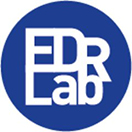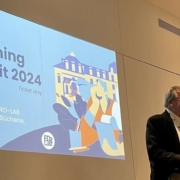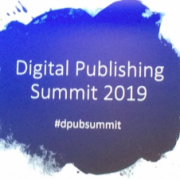DPUB Summit 2022 Returns to an In-Person Event
 EDRLab’s popular annual conference returned to an in-person event this year and took place in Madrid straight after the Readmagine conference. The audience included decision makers, content designers, software and hardware engineers, publishers, accessibility specialists, and many other enthusiasts in the field of digital publishing. With 15 speakers and many accessibility-focused sessions, the DPUB conference was as successful as ever.
EDRLab’s popular annual conference returned to an in-person event this year and took place in Madrid straight after the Readmagine conference. The audience included decision makers, content designers, software and hardware engineers, publishers, accessibility specialists, and many other enthusiasts in the field of digital publishing. With 15 speakers and many accessibility-focused sessions, the DPUB conference was as successful as ever.
Virginie Clayssen, President of EDRLab, gave a welcome introduction which was followed by an overview of the conference given by Laurent Le Meur, CTO of EDRLab. The full program can be accessed at the EDRLab event website.
Cristina Mussinelli (Fondazione LIA), who moderated a panel on accessibility comments:
DPS and Readmagine provided a very interesting opportunity to listen to many different presentations focused on innovative and emerging trends in the publishing ecosystem from key players, from library lending to subscription, from comics to academic publications. Accessibility is clearly becoming an important element to be considered when speaking of digital publications and the different experiences presented were very useful to understand the current state of adoption from different members of the supply chain and in different countries.
Our readers will be particularly interested in the following sessions:
Thorium Reader 2.0, What New?
Daniel Weck (EDRLab and DAISY) presented the latest evolution of the Thorium Reader – 2.0, the free, open-source, multi-platform, multi-lingual, accessible and LCP compliant desktop reading application developed by EDRLab. Thorium is becoming a reference for its support of EPUB 3, but it also supports PDF, DAISY, Audiobooks and Divina publications. This new version has scored 100% on epubtest.org (excluding the “annotations” part which will be implemented in the coming months), the DAISY Consortium’s testing protocol for accessible reading solutions.
Daniel’s slide deck is available for you to explore Thorium 2.0 in more detail.
EPUB 3.3, a W3C Standard with a Test Suite
Ivan Herman (W3C) gave a remote presentation on the new version of the EPUB standard, EPUB 3.3. This latest version is the first to be published as an international Web Standard in the form of a W3C Recommendation. Ivan’s slides give us a terrific overview of the new version of EPUB
Leah Brochu (NNELS) attended the event and gave us this insight into her experience:
The Digital Publishing Summit was an excellent event, full of folks who do meaningful work in prioritizing and advancing inclusion and accessibility. It quickly became clear that, although the European Accessibility Act is a big driver in the advancement of accessible publishing practices in Europe right now, it is not the most important factor. Nearly every presentation, panel, and presenter highlighted the importance of accessibility for the sake of its impact on society, not just because legislation demands it. There is a lot of work to be done, but many key people and organizations are well on their way; in the hands of these folks, the goals of the EAA are in reach, and other markets can learn a lot from them!
The Accessibility Clock is Ticking
The European Accessibility Act will come into force in 2025, and there are still so many tasks to achieve in Europe. This session, moderated by Cristina Mussinelli (Fondazione LIA), introduced studies and experiences in Italy, France and Spain.
- Gregorio Pellegrino (Fondazione LIA) described the status of the work of the W3C Publishing community on image descriptions, the accessibility summary and other accessibility topics.
- Gautier Chomel (EDRLab) discussed the ongoing work in France on recommendations for signaling native accessible ebooks in bookstores in a standard way.
- Melissa Haquenne (De Marque), looked at the current situation in Quebec and Spain, explaining production challenges for publishers and the difficulties they face in documenting accessibility metadata.
- Dienaba Dia (Ministère de la Culture, France) commented on the current situation in France and the work in progress with incisive comments concerning the economics of accessibility and the cost of transforming backlist titles.
Gregorio has let us know:
The afternoon of the Digital Publishing Summit focused entirely on the topics of digital publishing standards and accessibility. Our panel, “The Accessibility clock is ticking,” was an important moment to take stock of the European and global effort (e.g., with Quebec publishers) and the big challenges ahead we prepare for the implementation of the European Accessibility Act. Certainly, one of the big challenges that emerged, for those who produce ebooks and want to produce them born accessible, is the alternative description of images: a job that requires time and specific skills.
A Use Case Around Accessibility at Hachette Livre
As the previous panel impressed upon us The European Accessibility Act is close but it’s fair to say that many publishers don’t know how to implement one of its main components : the integration of accessibility metadata in ONIX feeds and EPUB 3 publications.
Vincent Gros (Hachette Livre) presented a practical use case: an automated process for adding accessibility metadata to EPUB 3 new releases. It’s always invaluable to see a practical example of this type of challenge and this was no exception. The chicken and egg dilemma as to which type of metadata should be in production first is difficult for publishers and Vincent described the choices that Hachette Livre have made to to ensure accessibility metadata is embedded within the production workflow.
FXL Made Accessible? Yes it is Possible
As most of our readers are aware, the EPUB 3 standard comes in two flavours: reflowable and fixed-layout (FXL). W3C members from the publishing industry are currently trying to define recommendations on how to make FXL publications (quasi-)accessible.
Vincent Wartelle (CEO of ISI, France) showed delegates a professional solution used by French, African and Brazilian school publishers.
Concluding Thoughts
Daniel Weck’s overall thoughts on the event were:
It was great to be able to reconnect with colleagues I hadn’t seen in person for many months. This was also an opportunity to make new friends, and to share perspectives on a variety of subjects. The speakers line-up was great! The topics flowed seamlessly, not just on stage but also during coffee breaks. It all feels like a blur now. Hopefully it won’t be long until we can all watch the recorded talks. Congratulations EDRLab, and many thanks to the sponsors that made this possible! See you next year!!
Congratulations to EDRLab for such a thought-provoking and exciting event! We look forward to be able to share more resources from DPUB as they become available.






